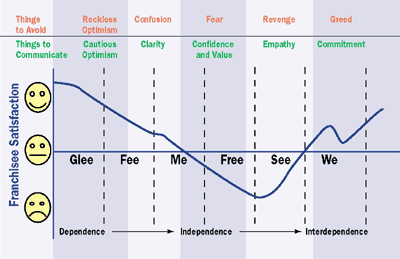< BACK
On this page:
What is Franchise Law?
The purpose of Franchise law is to help two parties, franchisors and franchisees, reach agreement and take advantage of a business opportunity together.
The franchisor contributes a successful business, a replicable business system, a “business-in-a-box” complete with products, services, policies, procedures, brand, training, and support to assist the achievement of franchisee success..
The franchisee contributes an up-front fee, a royalty or fixed charge, but more importantly, a commitment and drive to build and grow a successful business.
Franchise Law grants rights to the franchisee to operate the business and use the system and products that the franchisor has created.
Are you a prospective franchisor wanting to scale your business? What you need to know before you franchise your business
Are you a prospective franchisee wanting to purchase a successful franchise? What you need to know before you buy a Franchise
Franchisors: What you need to know before you franchise your business
8 common reasons to franchise your business
Which statements are true for you?
-
You want to earn a franchise fee and ongoing royalties
-
Easier access to expansion capital
-
Creation of a team of “partners” who share your values and objectives of growing your brand
-
Replace store managers with more committed store owners
-
Growth without sacrificing control
-
Lower failure rate and minimise growth risk
-
Better market penetration
-
International potential
FAQ #1: “Can I franchise my business?”
Can you say “yes” to the most/all the following 11 questions? If so, it’s worth going to the next step in our process.
-
Have you proven your business model with a successful pilot for some time?
-
Have you created a business system that can be replicated again and again?
-
Do you have the capital to franchise your business (training programmes, legal documents, operating manuals, marketing materials, marketing budget etc)?
-
Are you prepared to pour value into your team of franchisees over the long-term?
-
Is there growth potential in this industry?
-
Does your business concept have long-term viability?
-
Can you offer your franchisees a competitive advantage?
-
Can your franchisees expect to make a reasonable return on their investment?
-
Can franchisees and their employees be trained up in a reasonable amount of time?
-
Have you determined how challenging it will be for franchisees to find affordable business premises?
-
Have you determined the right size territory to support one of your franchises?
If you answered “yes” to the most/all of those 12 questions, then it’s worth going to the next step in our process.
FAQ #2: “How does knowing about the franchisees 6 stages of happiness help me?”
In the book “The Franchise E-factor” by Greg Nathan, you’ll learn about the 6 stages that franchisees go through.
If you are a franchisee you can use it to become more aware of your current and future emotional states.
If you are a franchisor you can use it to gain an empathy for what your franchisees are going through, and do what you can to help guide them through to the next stage. The most productive for both parties is the 6th stage, the “We” stage.

-
The “Glee” stage
-
The “Fee” stage
-
The “Me” stage
-
The “Free” stage
-
The “See” stage
-
The “We” stage
Source: http://www.franchise-chat.com/resources/the_e_factor.htm
FAQ #3: “What are the major pitfalls to avoid when franchising my business?”
-
Having an unequal balance of profit sharing
-
If both the franchisor and franchisees are making good money, everyone likely to be contented
-
If either party’s expectations are not being met, resentment and disagreement can arise this may unbalance the system
-
Building up expectations that don’t match reality
-
Franchises work best when both sides value the system equally, and equally share in it’s success.
-
This is why creating high quality franchise documentation set expectations early and minimise disappointments later
-
Being tempted to copy a friends franchise agreement as a starting point to franchising your own business
-
These attempts at short-cutting the process are easy to spot. You’ll lose credibility in the eyes of potential franchisees
-
It demonstrates a lack of commitment to the process, a lack of care in creating a system.This scares off investment by a prospective franchisee
-
Using a ‘non qualified’ franchise consultant
-
Not carefully selecting your franchisees
-
Ignoring the expertise and advice that the Franchise Association of NZ has to offer
-
Not getting franchise law experts, such as Harris Tate, involved early enough
FAQ #4: “What happens if my franchisee breaks the rules?”
Here are 3 examples of situations you might face:
-
A site inspection reveals a cleanliness issue and you issue a breach notice that requires your franchisee to fix the issue within 30 days, but they don’t respond, what do you do next?
-
One of your franchisees fails to achieve a monthly performance/sales target, what do you do?
-
A franchisee breaches its confidentiality obligations, how do you respond?
Harris Tate can help you franchise your business: Our 7 step process
So, you’ve run a successful pilot business for a few years and wonder if franchising is the next step for you?
Firstly, congratulations on your success, be proud. You’ve earned it.
Here’s what happens next:
-
You make initial contact with us
-
We arrange our first meeting (in person is best)
-
Protect your Intellectual Property
-
The first step is to identify your Intellectual Property and ensure it is protected
-
Have you registered and protected your business name, brand, logo, trademarks, colours, devices etc?
-
Do you have secret formulas? Specific business processes? Are they protected?
-
Conduct a feasibility study
-
Next, we’ll recommend you to a reputable franchise consultant that we know and trust
-
They’ll help you determine if your idea is viable, determine your initial franchise fee, the structure of ongoing monthly fees, royalties (a percentage of gross revenue), the marketing fees, territory, systems etc
-
Prepare a legal brief
-
If the feasibility study gives you a green light to proceed, the next step is for your franchise consultant to prepare a legal brief
-
The legal brief contains instructions to regarding all the essential parts of the franchise system.
-
Be prepared to invest wisely on this work. Don’t be tempted to go with a non proven/recognised franchise consultant. It’s important you use one that has the skill to do it properly to save you anguish later. For a list see www.franchiseassociation.org.nz for member consultants
-
Prepare franchise documents
-
Now it’s time to put the whole package together: The franchise agreement, licences for Intellectual Property, a suite of employment documents, confidentiality agreements, and a range of other documents that you’ll need
-
Start recruiting
-
Congratulations, you’ve got everything you need to start granting your franchises!
-
We can help with the negotiation process, and any amendments and refinements to your documents and processes
3 reasons franchisors choose Harris Tate
-
Our Team:
-
Our Experience:
-
Our Connections:
-
Our team has built up a huge number of quality connections over the years, both locally and internationally. We know the answer to almost every question, and if we don’t, we know who to talk to to find out the answer
Next steps
Call us today on +64 7 578 0059, or contact either Michelle Carabine, or Oliver Moorcroft.
^back to top
Franchisees: What you need to know before you buy a franchise
Which statements are true for you?
10 common reasons to buy a franchise
-
The convenience of a turnkey business, a business-in-a-box, a complete end-to-end system
-
A business with a proven track record and a strong return-on-investment
-
Less risk, higher chance of success
-
Training programme, ongoing operational support and marketing assistance
-
Easier access to financing, better purchasing power
-
Brand awareness, name recognition, corporate image
-
Tap into instant business expertise and business data
-
A team of people working to help you succeed, bypass common mistakes
-
Assistance with locating an ideal premises location, and construction/fit out expertise
-
You are rapidly building an asset that can be on-sold later
FAQ #1: “What’s a good franchise to buy?”
Ask yourself these 5 questions to find out the right answer for you:
-
Is there a business that interests you more than others?
-
What are your goals?
-
What’s your exit plan?
-
Where is this business in the lifecycle?
-
What do I need to consider?
FAQ #2: “What are the major pitfalls to avoid?”
-
Not undertaking proper due diligence before you signed
-
Not choosing a reputable system in the first place
-
Not being conscious of your stage in the “6 stages of happiness”
-
Becoming dissatisfied about the level of support you are given and not giving the franchisor the opportunity to respond
-
Not following the franchise system
-
Not working with the franchisor and other franchisees as a team
Harris Tate can help you purchase a franchise: Our 7 step process
-
Train yourself up
-
Do the free, pre-franchise training course through The Franchise Association of New Zealand http://www.franchiseassociation.org.nz/franchisee-pre-entry-education-programme.html
-
You’ll learn what questions to ask and who to talk to to get the advice you need
-
Come and see us
-
Let’s thoroughly examine the franchise agreement you’ve been given
-
We’ll convert the legal jargon into plain speak so you know what your obligations are
-
Are the terms fair? Is the agreement well put together? Are there any red-flags that you need to be aware of? We will let you know this too
-
Begin the due diligence stage
-
Start collecting industry knowledge. Find out the things you need to know. For example, interview all of the franchisees. Ask them questions like: “if you could turn back time, would you do it again? What would you do differently? What do I need to know?”
-
Get your finances in order
-
It’s time to get sound accounting advice from an accountant that specialises in franchises (ideally, one that is a Franchise Association of NZ member)
-
Talk to a bank with a strong knowledge of franchising
-
Interview the franchisor
-
Ready to go ahead?
-
Does the business stack up? Does the money work?
-
We can also help with appropriate advice regarding the structure for ownership of the business, leasing premises, and borrowing money
3 reasons franchisees choose Harris Tate
-
Our Team:
-
Our Experience:
-
Our Connections:
Next steps
Call us today on +64 7 578 0059, or contact either Michelle Carabine, or Oliver Moorcroft.
^back to top





